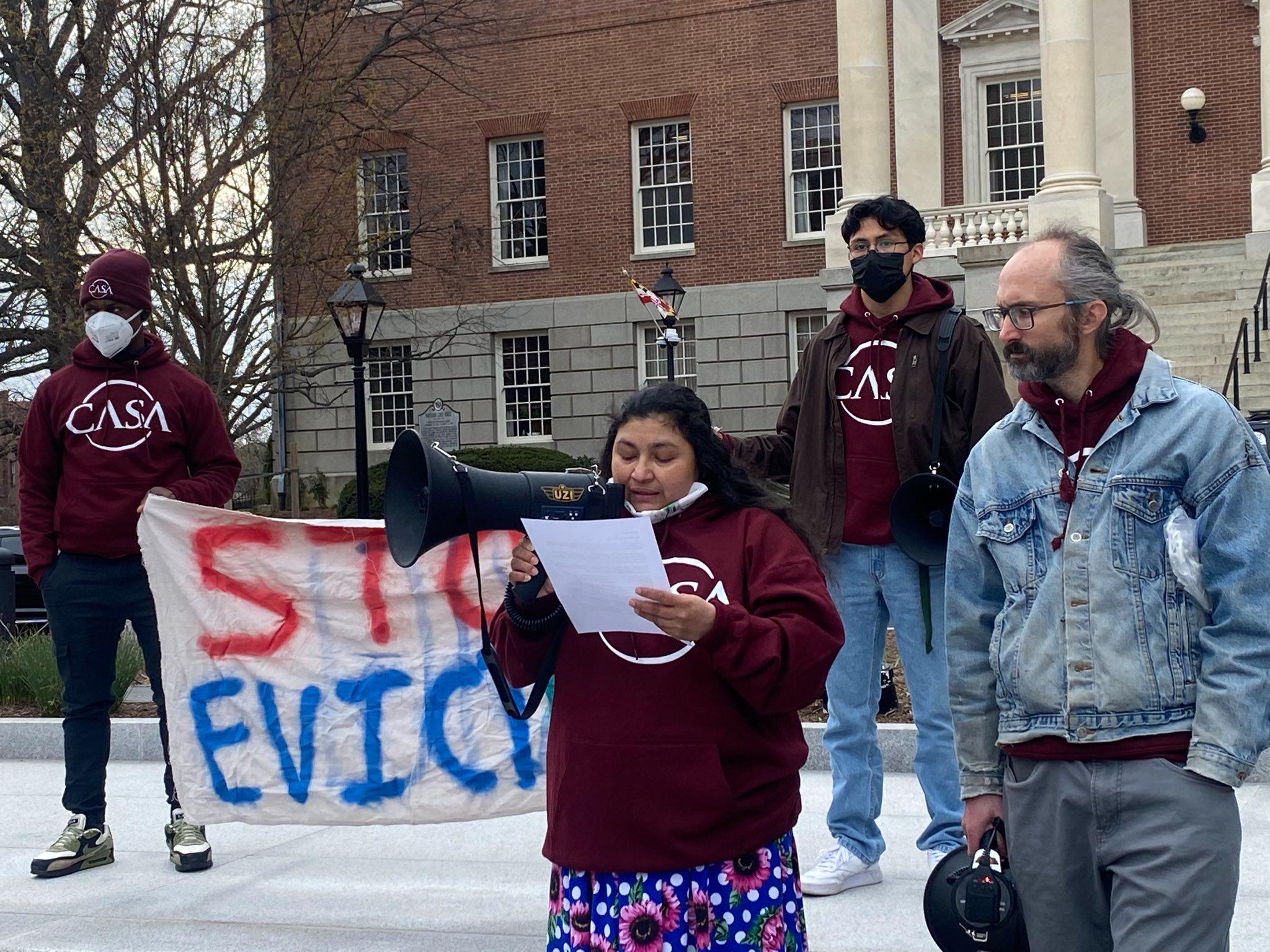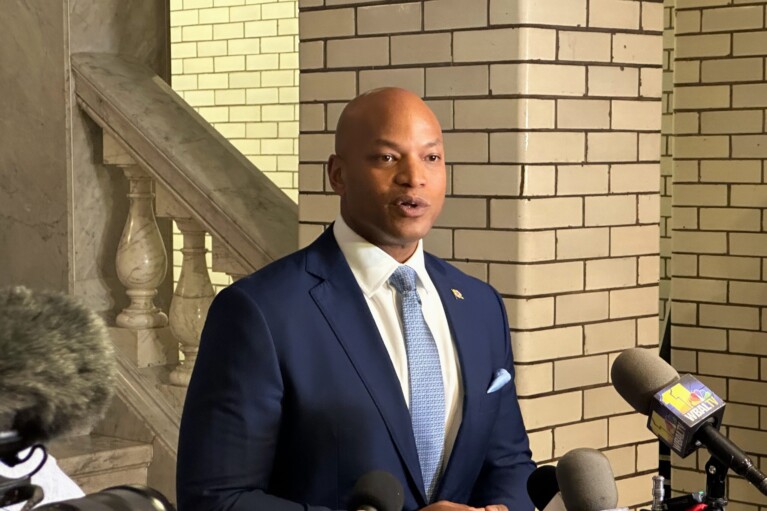General Assembly Advances Tenant Protection Measures

Tenants and advocates are calling on lawmakers to do more to protect tenants in the final days of the 2022 General Assembly session — to avoid a repeat of the 2021 session, when several consequential tenant protection measures failed to pass.
Fair housing advocates are particularly pushing a measure that would allow tenants to ask a judge to temporarily delay an eviction if they have applied for rental assistance.
Rent relief funding has been slow to get to many tenants who have applied, leaving some to face eviction while waiting for assistance.
“I applied for rental assistance months ago and I have court on Friday for an eviction and my children and I have no place to go,” Evelyn Estrada, a tenant and member of the immigrant advocacy organization CASA, said at a rally at Lawyers’ Mall outside the State House earlier this week. “We don’t want to get thrown on the street.”
Senate Bill 384, sponsored by Sen. Shelly L. Hettleman (D-Baltimore County) would require a judge to delay eviction proceedings if a tenant can prove they have a pending application for rent assistance. The bill would also allow a judge to delay an eviction, even if the judge has already ruled in favor of the landlord. But it limits the delay to no more than 35 days.
The measure would apply only to tenants with pending rental assistance applications “submitted before or within 30 days after the tenant’s landlord filed a written complaint regarding the failure to pay rent.”
The bill passed the House of Delegates on Friday and will be sent to the governor’s office soon.
anneke dunbar-gronke, an attorney with the Lawyer’s Committee for Civil Rights Under Law who does not capitalize their name, represents low-income Black tenants facing eviction and praised lawmakers for moving the bill Thursday.
“There is about $400 million available in rental assistance, and renters are applying for it,” dunbar-gronke said in an interview. “It just doesn’t make any sense for a landlord to be able to evict someone while that money is on the way.”
dunbar-gronke said without the protections in that bill, people of color, particularly Black women who are the head of their household, would be disproportionately subject to eviction.
Hettleman said that each of Maryland’s 24 jurisdictions had to stand up a local rental assistance program to receive federal rent relief funding, and that thousands of rent relief applications are pending statewide. Hettleman said the bill also would help by giving local jurisdictions time to clear rental assistance backlogs.
Matt Hill, an attorney with the Public Justice Center, said the state is still seeing hundreds of evictions each month, despite the millions in rental assistance available and court backlogs.
“No one should be evicted when there’s money to pay the rent,” Hill said.
Hill noted that the Senate Judicial Proceedings Committee amended the bill to end after three years, as well to require that tenants must have applied for assistance no later than 30 days after a landlord filed for eviction. That means that, if tenants wait too long to apply for rental assistance, they won’t qualify for the stay, he said.
Del. Vaughn M. Stewart (D-Montgomery), who sponsored the House version of the bill, said there is “broad recognition that even though the pandemic is subsiding, there are a lot of Marylanders who are still hurting and there are a lot of Marylanders who are facing eviction and homelessness.”
The Apartment and Office Building Association (AOBA) of Metropolitan Washington, which lobbies for landlords, called rental assistance programs “painfully inefficient and fraught with inconsistency.”
“AOBA members with properties in Montgomery County cite a range of between 30 and 130 days between the time an application is submitted and when notice of funding and payment is received,” the group said in an email Thursday. “Processing of [Emergency Rental Assistance Program] applications takes significantly longer in Prince George’s County, running between 2 and 12 months. Some members still have applications pending dating back as far as February 2021. Making matters worse, the programs have both been closed to new applications, in spite of having substantial funds still in the coffers. This effectively renders all new delinquencies ineligible for public assistance and likely uncollectible.”
Maryland lawmakers created a fund to pay for access to counsel in eviction cases for low-income tenants last year, but after a separate bill that would’ve increased court fees to pay for the program failed to pass before the end of the 2021 session, no money went into the fund.
This year, lawmakers appear to be on track to fund the program before the end of the legislative session.
When House and Senate budget negotiators met Thursday, they added $10 million in funding to the Maryland Legal Service Corporation for access to counsel services, including for eviction.
Also on Thursday, the House passed two measures meant to fund the access to counsel in evictions program.
Senate Bill 662, sponsored by Sen. Craig J. Zucker (D-Montgomery), would require the comptroller to send $14 million from abandoned property funds to the access to counsel fund for the 2024 fiscal year.
Senate Bill 279, sponsored by Hettleman, would also send to that fund, money that the state receives from enforcing financial penalties under the Maryland Consumer Protection Act for “unfair, abusive, or deceptive trade practice[s] for rental residential property.”
Money received by the aggrieved party and to reimburse the Attorney General’s cost of bringing the action is excluded from that bill.
Hill also urged lawmakers to pass Senate Bill 564, which would require judges, if asked, to grant a five-business-day continuance for parties in an eviction case to seek legal representation. The bill also would allow parties to request a recess to seek eviction prevention services if an eviction prevention provider is located within the same court building during the trial.
Editor’s Note: This story was updated Friday to reflect the House of Delegates passage of Senate Bill 384.




 Creative Commons Attribution
Creative Commons Attribution